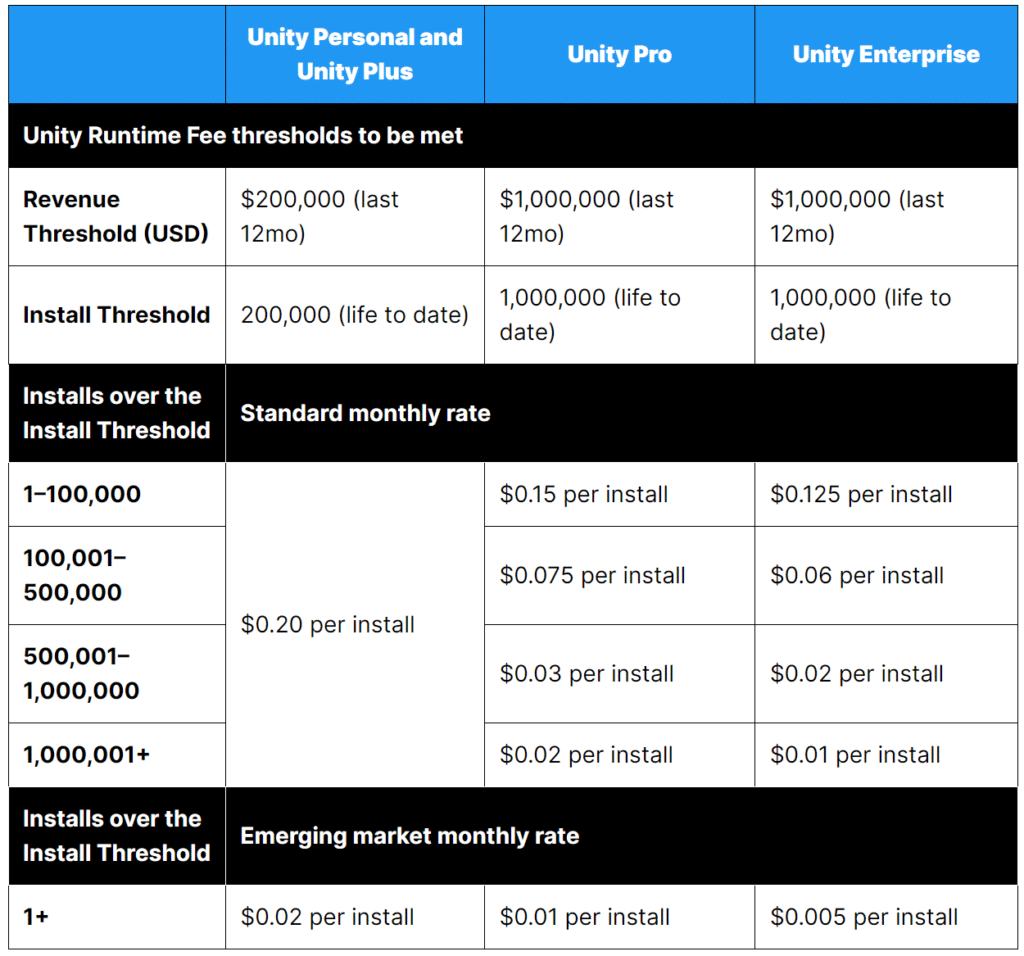Today Unity have announced several massive changes to their pricing structure and the plans available to users of the Unity game engine. The heart of the changes is a new Unity Runtime fee, that kicks in January 1st (even on already shipped Unity titles!), which will require developers to pay a fee each time the game runtime is installed. The Unity Runtime is essentially the cross platform shim that enables Unity to run on a number of platforms and is an essential and required part of every Unity game. In addition to the Unity Runtime tax, they have also announced changes to the available plans, including improvements to the free Personal Tier, the removal of the Plus tier and additional cloud services for all tiers.
First details of the Runtime fee from the Unity blog:
We are introducing a Unity Runtime Fee that is based upon each time a qualifying game is downloaded by an end user. We chose this because each time a game is downloaded, the Unity Runtime is also installed. Also we believe that an initial install-based fee allows creators to keep the ongoing financial gains from player engagement, unlike a revenue share.
Thresholds for revenue and installs
Games qualify for the Unity Runtime Fee after two criteria have been met: 1) the game has passed a minimum revenue threshold in the last 12 months, and 2) the game has passed a minimum lifetime install count. We set high revenue and game install thresholds to avoid impacting those who have yet to find scale, meaning they don’t need to pay the fee until they have reached significant success.
Only games that meet the following thresholds qualify for the Unity Runtime Fee:
- Unity Personal and Unity Plus: Those that have made $200,000 USD or more in the last 12 months AND have at least 200,000 lifetime game installs.
- Unity Pro and Unity Enterprise: Those that have made $1,000,000 USD or more in the last 12 months AND have at least 1,000,000 lifetime game installs.
Details of the amount of the fee are as follows:

The details on how “runtime installs” are going to be tracked are currently vague, being a combination of analytics, app store data, self reporting and possibly an application phoning home to Unity, which opens up a whole new world of problems.
There are changes to the plans as well, with the Personal tier actually being improved quite a bit:
Unity Personal will remain free and we will be removing the annual revenue limit of $100,000 USD for eligibility to use the Unity Personal plan on January 1, 2024.
Starting in November, Unity Personal users will get a new sign-in and online user experience. Users will need to be signed into the Hub with their Unity ID and connect to the internet to use Unity. If the internet connection is lost, users can continue using Unity for up to 3 days while offline. More details to come, when this change takes effect.
Also in November, new and existing Unity Personal plans will gain access to new features, including:
- Unity Asset Manager with 10GB of storage, non-CAD web viewer, asset versioning, and integrations with Unity Version Control.
- Unity DevOps with 3 seats, 5GB of storage, and 200 Windows build minutes (more seats, storage, and build minutes will be available for an additional fee)
- Team Administration tools with Base roles (Owner, Manager, User, Guest), and Finance roles
- Unity Sentis lets developers embed a running AI model in the Unity Runtime inside their game or application. This enables models to be run on user devices without additional cloud-compute costs or network latency.
Effective January 1, 2024, we are removing the annual revenue limit of $100,000 USD for eligibility to use the Unity Personal plan.
Games made with Unity Personal that have made $200,000 USD or more per year AND with at least 200,000 lifetime installs, will be subject to the Unity Runtime Fee.
More details are available in the links below.
Key Links
Unity Pricing Change and Unity Runtime Fee Announcement
You can learn more about Unity pricing changes and new Unity runtime tax in the video below.
